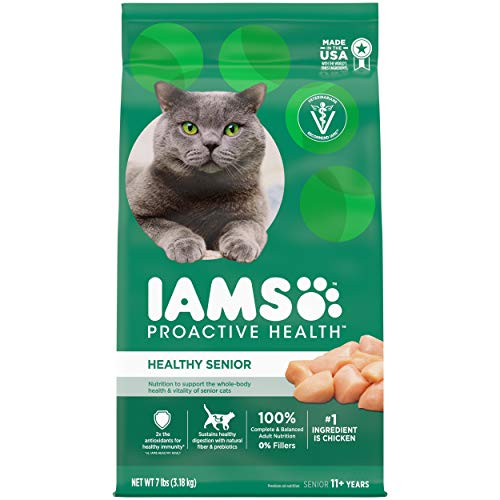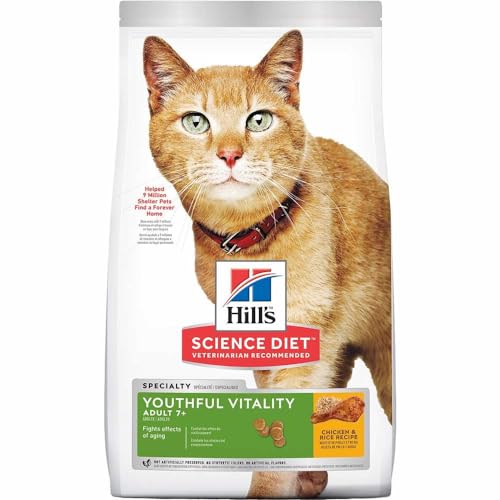The best dry food for senior cats should be high in protein, low in carbohydrates, and easy to chew. Ensuring your senior cat’s diet meets their specific nutritional needs is crucial for their overall health and well-being.
As cats age, their dietary requirements change, and it’s essential to provide them with a balanced diet that supports their aging bodies. Senior cats may have dental issues that make chewing harder, so choosing a dry food with smaller, easily manageable kibble is important.
Additionally, look for formulas that are specially designed for senior cats, as they often contain joint support supplements and lower levels of phosphorus to support kidney health. Providing your senior cat with the best dry food tailored to their needs can help them maintain a healthy weight, support their immune system, and keep them active and happy in their golden years.
Buying Guide On Best Dry Food For Senior Cats
Best dry food for senior cats buying guide 1. Assess your cat’s nutritional needs: before choosing a dry food for your senior cat, it is important to understand their specific nutritional requirements. Senior cats often have lower activity levels and may benefit from a diet that supports their joint health, digestive system, and overall aging process.
2. Look for high-quality ingredients: opt for dry cat food that features high-quality protein sources such as chicken or fish as the primary ingredient. Avoid products that contain fillers, artificial additives, or excessive amounts of carbohydrates. Whole grains, fruits, and vegetables should be included in moderation to provide necessary fiber and antioxidants.
3. Consider special dietary needs: senior cats may develop specific health concerns that require specialized diets. For example, cats with kidney issues might benefit from low-protein or low-phosphorus formulas, while cats with sensitive stomachs may require a food with easily digestible ingredients.
Consult with your veterinarian to determine any special dietary needs. 4. Choose a formula for weight management: as cats age, they can become less active and prone to weight gain. Look for dry cat food designed for weight management, which includes controlled calorie content and additional ingredients that promote satiety and a healthy metabolism.
5. Check for added supplements: senior cat food should contain essential vitamins and minerals to support their overall health. Look for formulas that include added supplements like omega-3 fatty acids for joint health, antioxidants for immune support, and probiotics for digestive health.
6. Consider texture and kibble size: senior cats may have dental issues or a decreased sense of smell, which can affect their eating behavior. Opt for dry cat food with a softer texture or smaller kibble size that is easier for your senior cat to chew and digest.
7. Read reviews and recommendations: take the time to read customer reviews and recommendations for the best dry food for senior cats. This can provide valuable insights into the palatability, effectiveness, and overall satisfaction of the product. 8. Introduce the new food gradually: when transitioning to a new dry cat food, it is important to introduce it gradually to avoid digestive upset.
Start by mixing a small amount of the new food with their current food and gradually increase the proportion over the course of a week. 9. Monitor your cat’s response: once you have selected a dry food for your senior cat, monitor their response to the new diet.
Look for signs of improvement such as increased energy levels, healthy skin and coat, and normal bowel movements. If you notice any negative reactions or concerns, consult with your veterinarian for further guidance. 10. Remember to provide fresh water: regardless of the dry food you choose for your senior cat, always ensure they have access to fresh, clean water.
Adequate hydration is essential for their overall well-being and can help prevent urinary tract issues commonly seen in older cats. Note: this buying guide aims to provide helpful information, but it is always recommended to consult with your veterinarian for personalized advice based on your cat’s specific needs and health status.
Conclusion
To ensure the health and happiness of your senior cat, it’s crucial to choose the best dry food for their specific needs. By considering factors such as age, health conditions, and nutritional requirements, you can make an informed decision that will support their overall well-being.
Remember to opt for a high-quality dry cat food that is specially formulated for senior cats, as these products typically contain essential nutrients and are easier to chew. Additionally, look for brands that prioritize real ingredients and avoid fillers, artificial additives, and excessive carbohydrates.
Regular vet check-ups can also help assess your cat’s dietary needs and make any necessary adjustments. By providing your senior cat with the best dry food, you can ensure they enjoy a healthy and fulfilling life in their golden years.











Leave a Reply